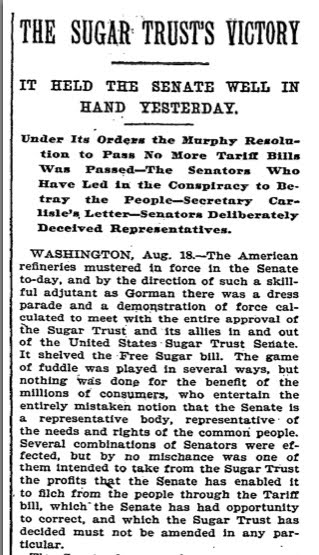The late 1880s and 1890s were a tumultuous time in U.S. Courts as sugar refineries scored a number of key victories, enabling them to become bigger and more powerful as trusts, and demonstrating the extent to which the sugar industry could maintain prices that would generate profits for those refineries.
The New York Times archives contains relevant reporting about the "Sugar Trust's" victories. Kind of funny that Big Business was (a) up to the same tricks then as now, and (b) the lovely politicians of our great nation could be bought back then just as they can be now.
From the first page of The New York Times, August 19, 1894:
http://query.nytimes.com/gst/abstract.html?res=9F07E1D7123BE533A2575BC1A9609C94619ED7CF
http://query.nytimes.com/gst/abstract.html?res=9A03E3DE1330E633A25756C1A9679D94699FD7CF
http://query.nytimes.com/gst/abstract.html?res=9A06E6DF1638E733A25757C1A9649C94669ED7CF
By the turn of the nineteenth century, the increasingly powerful "Sugar Trust" purchased large quantities of Cuban sugar and had an interest in influencing tariffs in order to maximize profits.
If Rick Berman were a vampire or otherwise somehow had the ability to have been alive and kicking in 1902, i would think he would probably be running the American Literary Bureau, which was no doubt a "non-profit"!
More sources on the Sugar Trust empire (this one mentions the Cuba connection):
http://query.nytimes.com/gst/abstract.html?res=9E03E6D6103DEE32A25750C0A9639C946397D6CF
 Indeed the folks involved in sugar refining were investing in Cuban sugar and wanted to maintain control over the refining process and expand their business empire. Even Milton S. Hershey got involved, building a sugar refinery town in Cuba he named Central Hershey, which supplied some of the sugar needed for his chocolate factory. http://www.cubaheadlines.com/2009/07/12/17962/hershey_foundation_helps_you_get_cuba.html
Indeed the folks involved in sugar refining were investing in Cuban sugar and wanted to maintain control over the refining process and expand their business empire. Even Milton S. Hershey got involved, building a sugar refinery town in Cuba he named Central Hershey, which supplied some of the sugar needed for his chocolate factory. http://www.cubaheadlines.com/2009/07/12/17962/hershey_foundation_helps_you_get_cuba.htmlhttp://pqasb.pqarchiver.com/chicagotribune/access/456969552.html?dids=456969552:456969552&FMT=ABS&FMTS=ABS:AI&type=historic&date=Feb+10%2C+1932&author=&pub=Chicago+Tribune&desc=U.+S.+OPENS+FIGHT+TO+BEAT+SUGAR+TRUST%27S+POWER&pqatl=google
Just as one example of the power that Big Sugar continued to wield: Sugar even played a role in the U.S. embargo on Cuban goods. The incidents leading up to the U.S. embargo on Cuban goods involved sugar at many of the twists and turns. Here are some examples:
The events leading up to the embargo
The U.S. Sugar industry, although it may not have been quite the monolith it was in the late 19th century, still exercised quite a bit of power politically.
Of course, there are still some powerful players in the US sugar world (especially in South Florida!), but as an entity, Big Sugar as a monolith would never quite hold the same powerful position again. In large part due to trust busting, but also in part, because more players emerged onto the scene.










No comments:
Post a Comment